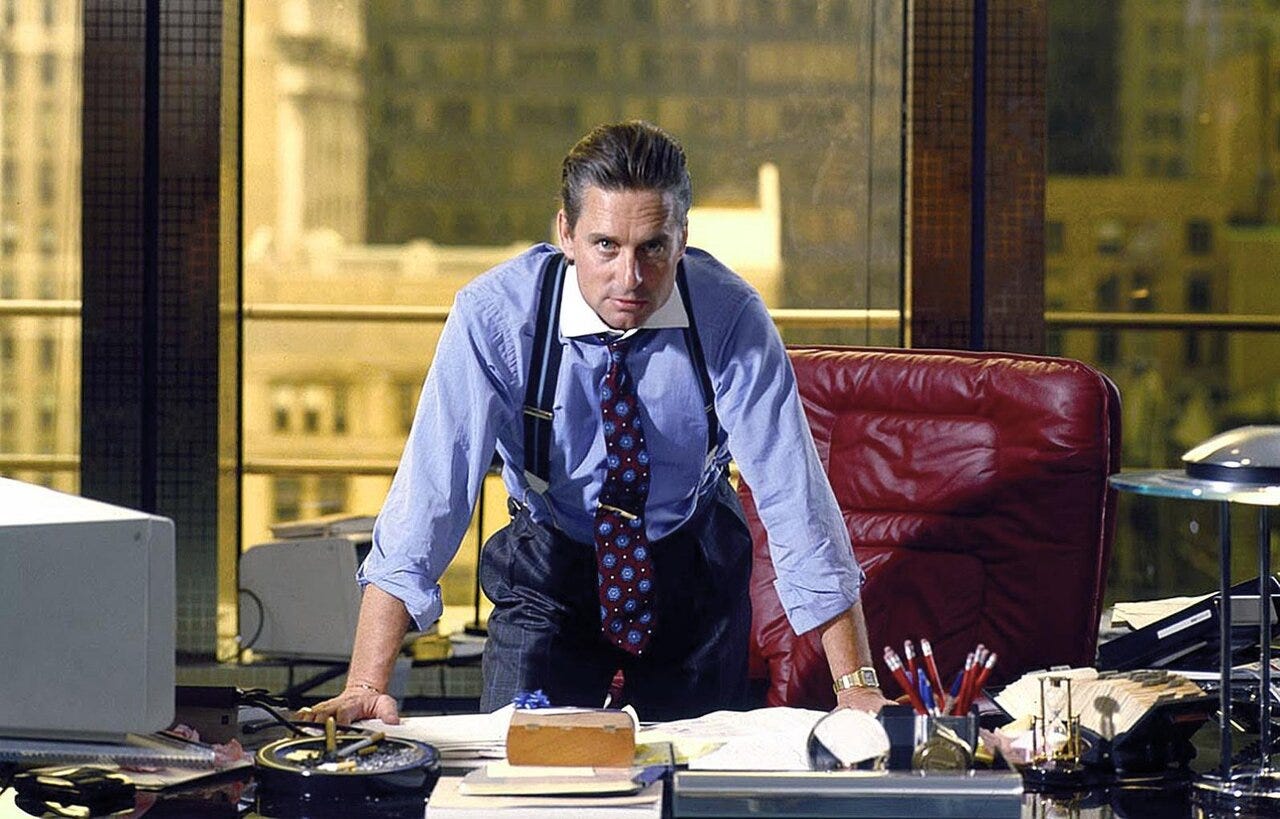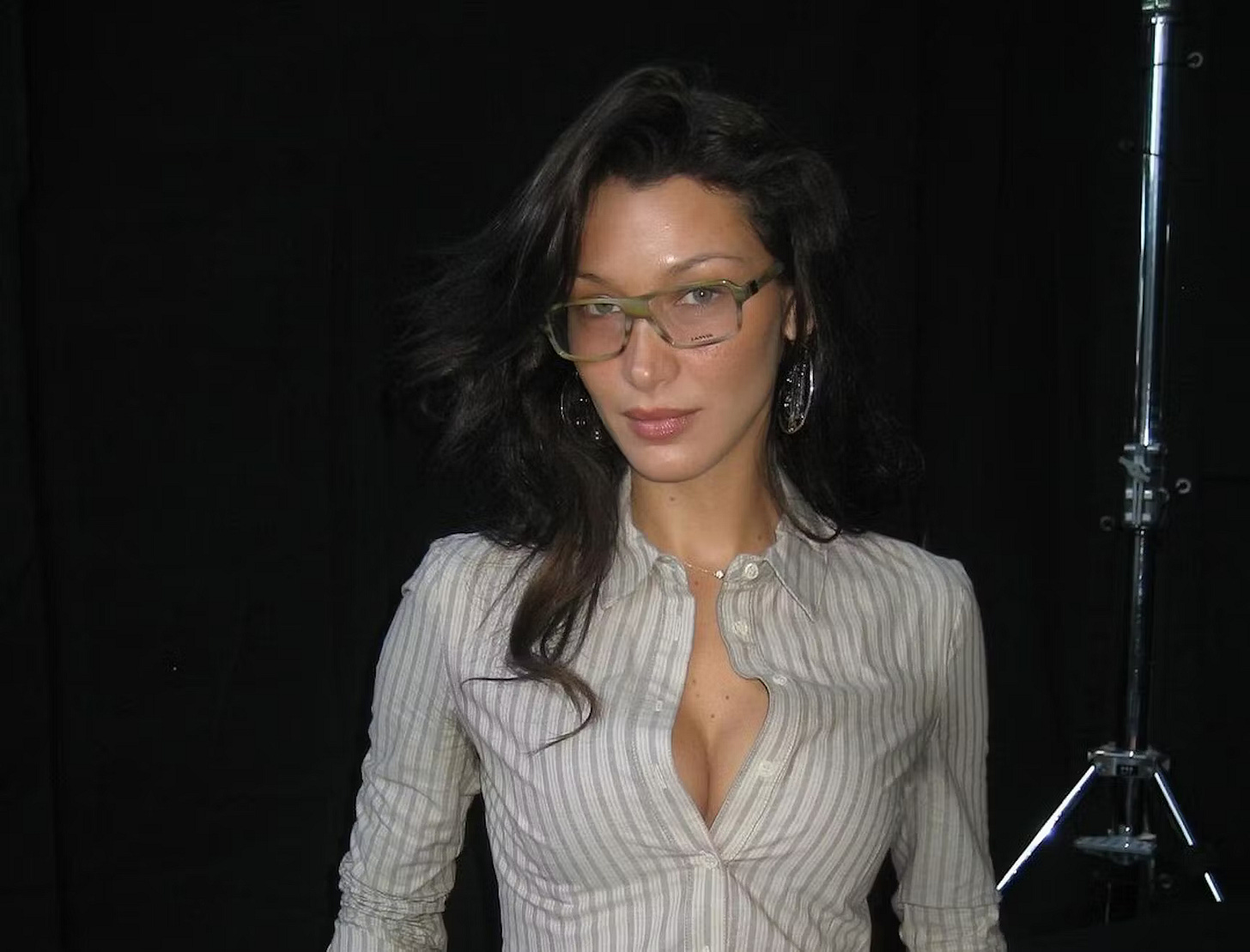Coffee's For Closers
how contemporary cultural portrayals of the office critique and reshape our understanding of corporate life, highlighting the office as a stage of performance
FKA Twigs steps into the frame of her latest music video, “Eusexua,” and transports us to an office rendered in grayscale. Workers sit in near identical tailored suits, their stiff postures reflecting the rigidity of their surroundings. The camera lingers on their movements—mechanical, detached—under the watchful eye of a boss whose presence dominates the room. The specifics of their tasks are irrelevant; what matters is the lifelessness of the space, the quiet surrender in simply showing up. Then, this bleak routine is interrupted: the workers rise, stepping onto chairs, peeling off their gray uniforms, shaking off the conformity that has bound them. The office dissolves, transforming into something primal, untamed. The lighting shifts from cold fluorescence to shadow and earth as the space morphs from repression to freedom and expression.
Although Twigs herself has likely never clocked into a 9-5 at a conventional office, her portrayal of this anonymous, soulless environment strikes a chord with the growing cultural perceptions of the workplace as a space of powerlessness and repression. The image of the gray-suited office, though increasingly at odds with the realities of remote and hybrid work in a post-COVID world, still holds power. The office, once a symbol of upward mobility and ambition, now stands as a monument to stifling conformity and the erosion of personal power.
This shift in perception didn't occur overnight. It's the result of a decades-long evolution in how we view, experience, and portray corporate life—a phenomenon we might call "Corporate Theater." In this ongoing cultural production, workers don't merely inhabit roles defined by their jobs; they re-perform the scripted dramas they've absorbed through popular culture. The line between art and reality blurs, creating a feedback loop where media representations of office life both critique and reinforce the roles workers play in real life.
To understand how we arrived at Twigs’ dystopian office fantasia, we must first revisit the foundations of modern corporate culture. In the 1950s, as America's manufacturing prowess reached its apex, the office emerged as a new frontier of labor. Early office layouts mirrored factory floors—regimented spaces where tasks were executed with assembly-line precision. However, as office work evolved to encompass more social and administrative roles, it gradually shed its industrial skin.
By the 1980s, the office had developed into something grander: a symbol of ambition, status, and power. This transformation was epitomized by the rise of the power suit. Tailored by designers like Giorgio Armani, these sartorial suits of armor clothed a new breed of corporate warrior. Films like Oliver Stone's Wall Street (1987) captured this shift, portraying the corporate world as a ruthless yet glamorous arena where characters like Gordon Gekko thrived. Stone intended Gekko's infamous "greed is good" monologue as a scathing critique of unchecked capitalism and financial sector excess and malfeasance. Yet, in a twist that would bewilder the director, audiences often overlooked the satire, seduced instead by Gekko's charisma and sharp tailoring. The film's intended critique of corporate life was lost in the allure of ambition and wealth, as viewers aspired to the very lifestyle the movie sought to condemn.
This glamorization of corporate excess wasn't limited to Wall Street. Films like Glengarry Glen Ross (1992) offered their own pointed criticisms of corporate culture, yet their sharply dressed, confident villains became cultural icons, overshadowing the deeper commentary. In Glengarry Glen Ross, we witness a brutal world where success is measured solely by one's ability to close deals. Alec Baldwin's Blake, with his "Coffee's for closers" ultimatum, embodies the ruthless logic of office hierarchy. The salesmen's desperation is palpable as they resort to bribery, manipulation, and even burglary to stay afloat. Despite the film's clear condemnation of this dehumanizing system, the magnetic portrayal of power and ambition—epitomized by Al Pacino's silver-tongued Richard Roma—contributed to the allure of corporate success.
Similarly, American Psycho (2000) skewers the hollow, performative nature of corporate ambition, yet its protagonist, Patrick Bateman, with his meticulous grooming routines and luxury lifestyle, became more of an iconoclast than a cautionary figure. In each case, corporate greed and hollow ambition were presented with such style and seduction that they became aspirational. The office was no longer just a place of structured labor; it was a gladiatorial arena where power was the ultimate prize. Expensive suits and corner offices became the spoils of victory in this high-stakes game.
However, the reality of corporate life often fell far short of these celluloid fantasies. As America's manufacturing sector began its long decline, many economists, following the prediction of John Maynard Keynes, assumed that technological advancements would usher in an era of shorter work hours and increased leisure time. Yet, political and economic forces conspired to thwart these optimistic projections. Instead of a more relaxed work schedule, the typical American office worker found themselves tethered to their desks for 40 or more hours each week—often with much of that time spent in a haze of unproductive busywork.
In this environment, a curious phenomenon emerged: the proliferation of what anthropologist David Graeber famously dubbed "bullshit jobs.” These roles, often birthed in the corporate boardroom, provided little tangible value to society but swelled the ranks of office workers nonetheless. Despite their lack of meaningful contribution, an entire class of workers in these positions grew, sustaining a system increasingly disconnected from the productive ideals once associated with labor.
The dissonance between the reality of office work and its glamorized portrayal in media set the stage for the corporate office to become a theater of status and ambition. Graeber observed that while many of these jobs were essentially pointless, they kept workers tied to the corporate hierarchy, offering an illusion of productivity while fostering resentment toward those whose work had real social value. As people spend 40+ hours a week in roles detached from any true purpose, they begin to act out personas molded by media portrayals.
Films like Wall Street and American Psycho critiqued corporate greed and hollow ambition, yet ironically provided avatars of success for audiences to emulate. The powerful antiheroes—ruthless dealmakers and meticulously polished sociopaths—became idols, not for their moral failings, but for the aura of dominance they exuded. While these films exposed the personal costs of such ambition, the images of power remained strong enough to counteract any warnings. The allure of control, influence, and wealth proved too tempting for many, and the cost of pursuing it didn’t seem severe enough to repel the desire.
By the end of the 20th century, sleek suits, luxurious offices, and cutthroat attitudes became the dominant monuments of corporate life. Figures like Donald Trump rose to prominence, becoming synonymous with wealth and power. His persona, crafted through media appearances, showcased success as a spectacle. Despite numerous business failures, Trump’s image as an untouchable mogul endured because the performance of power became more important than the reality behind it.
In a world where appearances overshadowed substance, Trump’s performative success resonated with those who aspired to wealth and status. The allure of such figures, whose achievements were often exaggerated, sustained the illusion that power and influence could be achieved at any cost. Even as the media highlighted the personal tolls of ambition, the promise of material success remained irresistible. The corporate office became less a place of actual productivity and more a stage where people acted out roles of dominance and ambition, often disconnected from any true purpose. This performative cycle left many workers chasing an image of success shaped by popular culture, rather than the reality of meaningful accomplishment.
As the 21st century unfolded, corporate culture appeared to undergo a transformation. The tech boom introduced a new vision of work that promised a break from the rigidity and hierarchy of traditional offices. Startup culture emphasized work-life balance, community, and disruptive innovation, with catchy mantras like "move fast and break things" shaping this seemingly fresh ethos.

In this new landscape, employees are encouraged to bring their "whole selves" to work, with hoodies replacing suits, and open floor plans and virtual meetings replacing cubicles. Yet, despite these surface-level changes, the core structures of corporate life remained intact. The 40-hour workweek persisted, as did the titles and hierarchies. Beneath the veneer of casual dress codes and relaxed environments, the same cutthroat attitudes of the past continued to hold sway. While companies spoke of community and innovation, the relentless drive for success and profit still defined corporate culture.
Interestingly, the real shift has occurred in how film and television portray corporate life. Following the 2008 economic crash and the comical presence of Donald Trump on social media, the varnish has worn off, exposing the truth about these so-called titans of industry. Whereas earlier films like Wall Street dramatized the power and excess of the corporate elite, modern shows like Succession and Industry offer a more cynical and unvarnished view. These shows strip away the glamor, revealing the hollow ambition and personal emptiness that often accompany corporate success. Characters may still idolize figures like Gordon Gekko, but they’re increasingly shown as trapped by the very systems they aspire to dominate.
Take Rishi Ramdani from Industry, for example—a finance bro projecting hypermasculinity and confidence, yet ultimately powerless, a pawn to the market forces that shape his life. He embodies the "company man," whose identity has become so deeply intertwined with the firm's success that his personal autonomy dissolves entirely. Similarly, Succession peels back the layers of corporate grandeur, revealing how figures like the Roy family are caught in cycles of repression and survival, rather than true power. Desperate for their father's approval, the Roy siblings vie for power that is ultimately hollow, revealing the emotional cost of their ambition.
In Succession, the portrayal of corporate life goes even further, turning the corporate office from a site of power into one of absurdity and melodrama. Cousin Greg embodies the quintessential "bullshit job," —his role is so vague that no one, including Greg himself, truly knows what he does. More of a barnacle than a vital employee, he clings to power by sheer proximity rather than merit. His position is a farcical manifestation of nepotism, highlighting the meaningless roles that often exist within corporate structures. Greg’s survival at Waystar Royco is driven not by skill but by incompetence and luck, perfectly capturing the performative nature of modern corporate life, where people maintain roles regardless of their actual contribution.
Succession pulls back the curtain on corporate excess, stripping away the sheen to expose the rot beneath. Logan Roy’s polished appearance and commanding presence can’t hide the exhaustion etched into his face or the empty glint in his eyes. Behind the glossy veneer of corporate dominance, he is trapped in a relentless performance of authority, his every move scrutinized, his every decision a gamble. The Roy siblings, surrounded by opulence, engage in a ceaseless dance for their father’s approval, their interactions a tangled web of manipulation and desperation. Despite their vast wealth and influence, their lives are a battleground of emotional turmoil and hollow victories, each triumph just another fleeting distraction from the deeper emptiness they face.
While audiences are drawn into the power struggles of Succession, none of the characters are particularly aspirational. The Roy family, despite their immense wealth, are all sad and broken figures whose greed has cost them deeply. The glamorous material items surrounding them act more as gilded cages than symbols of success. Each of the Roy siblings is a tragic figure, embodying the hollow pursuit of power. Despite having every advantage—wealth, privilege, and the best opportunities the world can offer—their personal lives are disastrous, and they are all comically incompetent at their jobs.
Logan Roy, while the show's villain, is far from the all-powerful antagonist typically seen in the media. Instead, he is petty, unscrupulous, and driven by an insatiable need for control. There is a bottomless pit inside him, making it difficult to feel any sympathy for his character. Despite his wealth and influence, Logan is revealed to be as broken as those vying for his approval, and the series continually exposes the emptiness behind the facade of success.
This theme of professional achievement masking personal failure is mirrored in Industry. Consider Eric Tao, whose promotion to a coveted senior role ironically coincides with the unraveling of his personal life, as his wife leaves him and his struggle with alcohol addiction spirals out of control. Like Logan Roy, Tao embodies both impressive power and deep personal failure. On the surface, he appears to be a paragon of professional success, but underneath, he is an addict, estranged from his family, and ultimately diminished despite his elevated position. His bespoke suits and luxury watches fail to conceal his emotional collapse; if anything, they only amplify it. These narratives subvert the once-aspirational image of corporate ascendancy, revealing a world of profound isolation, hollow victories, and spiritual decay.
The monetary excesses depicted in Succession and Industry aren't glamorous—they're grotesque. The characters’ opulent lifestyles serve as little more than a gaudy backdrop to their personal crises, highlighting the depth of their despair. These stories serve as modern-day parables: while there may be a pot of gold at the end of the corporate rainbow, it often comes at the cost of one’s soul, with the rewards offering cold comfort.
In tandem with the evolving view of the corporate office, fashion has also adapted to reflect and satirize these changes. The once-powerful image of the gray-suited office worker has devolved into a caricature, with contemporary fashion playing a central role in this satirical shift. Brands like Miu Miu now poke fun at corporate attire, replacing the traditional power suits with playful, exaggerated versions of office wear. Models who may never have set foot in a corporate office strut runways in oversized blazers and absurdly short skirts, their hair slicked back in severe buns, and square-rimmed glasses perched on their noses. Miu Miu’s collections aren’t just clothing lines but performative commentaries, swapping Giorgio Armani’s ceremonial power suits for something more humorous and subversive. Gray cardigans, once the uniform of middle management anonymity, are now cropped to reveal a cheeky flash of midriff, while pleated skirts, reminiscent of school uniforms rather than corporate wardrobes, are paired with prim buttoned-up shirts.
This look, dubbed the "office siren," is more than a fashion trend—it's a critique of corporate culture at a time when the office's relevance is in question. As remote work and the gig economy reshape our understanding of workspaces, this aesthetic serves as catharsis, mocking the outdated rituals of corporate life while acknowledging how ingrained they remain. The irony is thick: a generation that may never work in a traditional office now embraces the very clothes that once symbolized it, posing on Instagram and TikTok, far from any water cooler or boardroom.
This phenomenon exemplifies a complex feedback loop between media representations, fashion, and our collective perception of corporate life. As the physical office recedes from daily experience for many, its cultural shadow looms larger than ever. The "office siren" aesthetic, along with shows like Succession and music videos from artists like FKA Twigs, doesn't just reflect our changing relationship with work—it actively shapes it, offering a more detached, ironic lens through which to view corporate culture.
This perspective is as promising as it is revealing. By reframing the office as a stage for performance rather than an authentic space for self-realization, we gain the distance needed to critically examine its role in our lives. The performative nature of corporate rituals, once taken for granted, now stands exposed, inviting us to question the genuine value and meaning we derive from traditional work structures.
Yet, even as we mock and deconstruct the idea of the office, our need to create meaning from work persists. The challenge lies in leveraging this newfound awareness to imagine and construct alternatives that offer more authentic fulfillment. As we continue to grapple with the meaning of work in the 21st century, these cultural critiques serve as both mirror and catalyst—reflecting our current realities while spurring us towards potential futures where the performance of corporate life gives way to more genuine modes of existence.
In the end, the modern office emerges not just as a ladder to climb or a cage to escape, but as a complex symbol of our evolving relationship with work itself. It's a cultural touchstone that we simultaneously cling to and push against, a familiar stage where we play our parts with an acute awareness of the artifice. This tension between familiarity and critique, between performance and authenticity, may well be the crucible from which new, more fulfilling paradigms of work and meaning will emerge.
Thank you so much for reading! This essay was a bit of a challenge because office drama is such a huge genre with so many shows and films to sift through. I decided to go with the classics, but I’d love to hear your thoughts—what’s your favorite office drama or comedy? Leave a comment and let me know! Till next time!






Loved this essay! enjoyed looking at the office through the lens of films and shows.